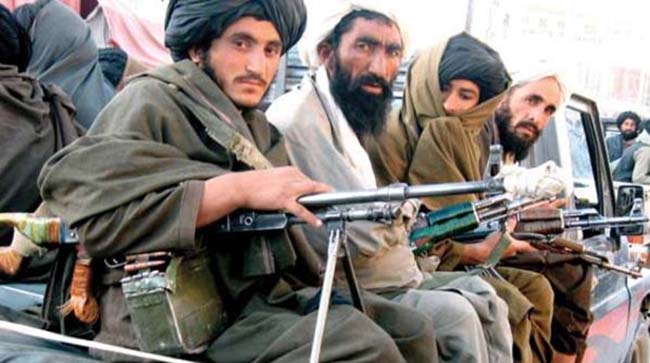Mullah Mansoor was born in a small village in the Maiwand district of Kandahar, a southern province of Afghanistan that shares border with Pakistan’s south-western Baluchistan province. Before assuming the leadership of Taliban, he functioned as the acting head of the movement on behalf of Mullah Mohammad Omar, the founder and spiritual head. In this capacity, he is understood to have authorized the release of periodic statement by Mullah Omar on the official Taliban website, even after Mullah Omar had been dead for a long time.
In 2007, when Pakistan security forces captured former Taliban defense minister and the group’s acting head, Mullah Obaidullah Akhund, in Quetta. The Taliban shura replaced him with Mullah Abdul Ghani Baradar and appointed Mullah Mansoor as one of two deputies. Mullah Baradar was arrested in a joint ISI-CIA operation in 2010, paving the way for Mansoor to become the acting head of the group. Mullah Mansoor was announced as the leader of the Taliban a year ago after it was revealed that Mullah Omar had died, probably a couple of years ago. Influential Taliban leadership moved quickly to confirm Mullah Mansoor as their leader, in a move aimed at preventing division.
Afghanistan experienced the most lethal and deadly attacks in Mullah Akhtar Mansoor tenure as Taliban head. But the question arises here that will Mullah Mansoor’s demise have any outstanding outcome on the current peace negotiations?
Mansoor has been an obstacle to peace and reconciliation process between the government of Afghanistan and the Taliban, prohibiting Taliban leaders from participating in peace talks with the Afghan government that could decrease the insurgency and conflict to some extent. The death of Mullah Mansoor who was consolidating his authority over a fracturing Taliban as the militants made major gains on the battlefield last year, would throw the insurgency into its second leadership crisis within a year. Still, it was unclear whether it could create any significant breathing space for the Afghan government, which struggled to bring the insurgents on negotiations table.
NATO Secretary General Jens Stoltenberg said Monday in a statement "Mullah Mansour stood in the way of talks between the Afghan government and the Taliban, blocking the prospects for progress towards peace and reconciliation for Afghanistan."
U.S President Barack Obama said the death of Taliban leader Mullah Mohammed Akhtar Mansour marks an "important milestone" in the longstanding effort to bring peace to Afghanistan. adding that “Mansour rejected efforts by the Afghan government to seriously engage in peace talks and end the violence that has taken the lives of countless innocent Afghan men, women and children. The Taliban should seize the opportunity to pursue the only real path for ending this long conflict - joining the Afghan government in a reconciliation process that leads to lasting peace and stability.”
Moreover, president Ashraf Ghani, since assuming office as Afghan president has expressed interest in holding peace with the Taliban, under certain conditions, but talks so far have foundered. Although the efforts made by Afghan government along with US, China and Pakistan have not yield any fruit but there is a great possibility that the death of Mullah Mansoor may provide the Taliban with an opportunity to pursue a peaceful solution.
The Afghan government should take advantage of Mullah Mansoor’s dead and bring other Taliban leaders to negotiation table since they showed eagerness in the past. On the other hand, Afghan government should also launch heavy military attacks to counter militants who are not willing to join the peace process.
It is for sure that the death of Mullah Mansoor will not have an immediate impact on the military operations of the insurgent group, which has been expanding in the recent months. However, in the status quo, Taliban will increase their attacks to signal Afghan government and its international supporters that they are still in power and can challenge them strongly. Besides, the Taliban may start launching wide-scale operation even more heavily than before to show that they are however solid regardless of their leader’s death.
Targeting Mansoor is a positive development but will not likely have a dramatic impact on the course of war in Afghanistan, said Michael O’Hanlon, an analyst at the Brookings Institution. “Well established organizations that are large with multiple key leaders can often survive the death of key leader,” O’Hanlon said.
Adviser to Pakistani Prime Minister on Foreign Affairs Sartaj Aziz on Friday Addressing the fifth round of Pakistan-Afghanistan dialogue organized by Regional Peace Institute, Aziz said that QCG comprising Afghanistan, Pakistan, US and China, has been making joint efforts for reviving direct talks between the Afghan Government and Taliban but Taliban have not yet responded positively to these efforts.
Now as the leader of the Taliban killed, Afghanistan along with Pakistan should suppress militants on ground as much as possible before the next leader assume complete control over the militants on the ground.
In addition, US Secretary of State John Kerry said on Sunday that the Taliban chief posed a continuing imminent threat” to US personnel in Afghanistan and to Afghans, and was a threat to peace. “This action sends a clear message to the world that we will continue to stand with our Afghan partners as they work to build a more stable, united, secure and prosperous Afghanistan,” Kerry said.
Since Mullah Mansoor was elected as a Taliban leader he had launched several substantial attacks in different provinces which killed and injured thousands of military and civilian personals. Therefore, his demise is definitely cherished between Afghans who suffered and sustained hard times during Mullah Mansoor tenure as Taliban leader .
Home » Opinion » Afghan Peace Process After Mullah Mansoor!
Afghan Peace Process After Mullah Mansoor!
| Ahmad Shah Karimi

